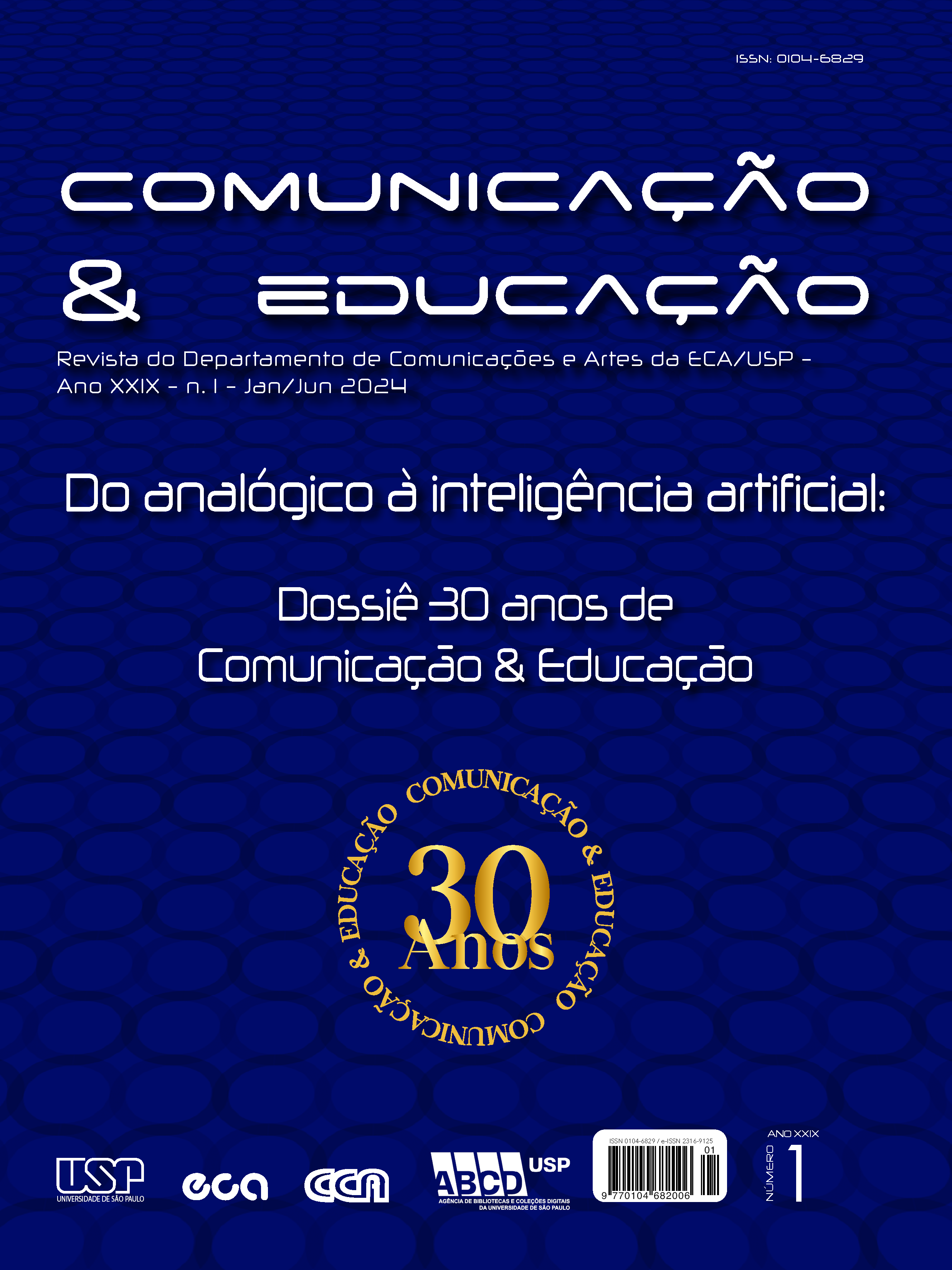Mirroring: GPT and education
DOI:
https://doi.org/10.11606/issn.2316-9125.v29i1p81-94Keywords:
ChatGPT, Comunicação, Educação, Algoritmos, MudançasAbstract
This study highlights some of the challenging elements surrounding ChatGPT for educommunicative studies. The ongoing advances in generative artificial intelligence have changed the ways of accessing information, preparing discourses, promoting translations between different languages, and activating intersemiotic potentials, which occur in an accelerated time and with relative operational ease. Therefore, this system includes economic and communicational processes with implications for the various segments of social life, the potentialities of which can be identified, despite questions surrounding the future the device holds for us. In this context, we consider that the different levels and series of education will be urged to implement strategies to recognize generative language models, dialoguing with them from an analytical-critical perspective.
Downloads
References
BENDER, Emily M; GEBRU, Timnit; McMILLAN, Angelina; SHMARGARET, Shmitchell. On the dangers of stochastic parrots: can language models be too big? Digital Library, [s. l.], 2022. Disponível em: https://dl.acm.org/doi/pdf/10.1145/3442188.3445922. Acesso em: 10 maio 2024.
CARNIELLI, Walter. GPT não foi treinado para dizer verdades. Abranet, [s. l.], 2024. Disponível em: https://www.abranet.org.br/Noticias/Walter-Carnielli%2C-da-Unicamp%3A-GPT-nao-foi-treinado-para-dizer-verdades 4766.html?UserActiveTemplate=mobile. Acesso em: 5 mar. 2024.
CHOMSKY, Noam; ROBERTS, Ian; WATUMULL, Jeffrey. Noam Chomsky: the false promisse of ChatGPT. The New York Times, New York, 2023. Opinion. Disponível em: https://www.nytimes.com/2023/03/08/opinion/noam-chomsky-chatgpt-ai.html. Acesso em: 13 jun. 2024.
CRARY, Jonathan. Terra arrasada. Além da era digital, rumo a um mundo pós-capitalista. São Paulo: Ubu, 2023.
HARARI, Yuval. Yuval Harari on threats to humanity posed by A.I. The New York Times, New York, 24 mar. 2023. Opinio. Disponível em: https://www.nytimes.com/2023/03/24/opinion/yuval-harari-ai-chatgpt.html. Acesso em: 10 maio 2024.
NICOLELIS, Miguel. IA não é inteligência e sim marketing para explorar o trabalho humano. Folha de S.Paulo, São Paulo, 2023. Disponível em: https://www1.folha.uol.com.br/tec/2023/07/ia-nao-e-inteligencia-e-sim-marketing-para-explorar-trabalho-humano-diz-nicolelis.shtml. Acesso em: 8 jul. 2023.
O´NEIL, Cathy. Algoritmos de destruição em massa. Como o big data aumenta a desigualdade e ameaça a democracia. Santo André: Rua do Sabão, 2020.
SEARLE, John R. Is the brain´s mind a computer program? Scientific American, New York, 1990. Disponível em: https://www.scientificamerican.com/article/is-the-brains-mind-a-computer-progr/. Acesso em: 30 maio 2023.
WITTGENSTEIN, Ludwig. The Blue and Brown Books: Preliminary Studies for the “Philosophical Investigations”. New York: Harper & Row, 1958.
ZUBOFF, Shoshana. A era do capitalismo de vigilância. A luta por um futuro humano na nova fronteira do poder. Rio de Janeiro: Intrínseca, 2019.
Downloads
Published
Issue
Section
License
Copyright (c) 2024 Adilson Citelli

This work is licensed under a Creative Commons Attribution 4.0 International License.
I authorize the publication of the submitted article and soon the copyrights to the magazine, in the printed and electronic version, if it is approved after the evaluation of the reviewers.
I understand that readers may use this article without prior request, provided the source and authorship are mentioned. Readers are not authorized to use this article for reproduction, in whole or in part, for commercial purposes.

































